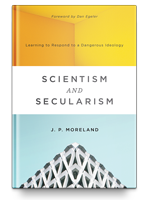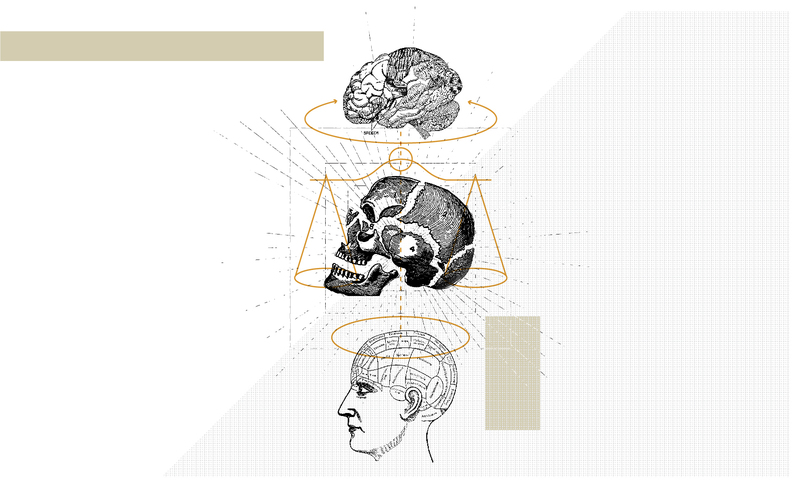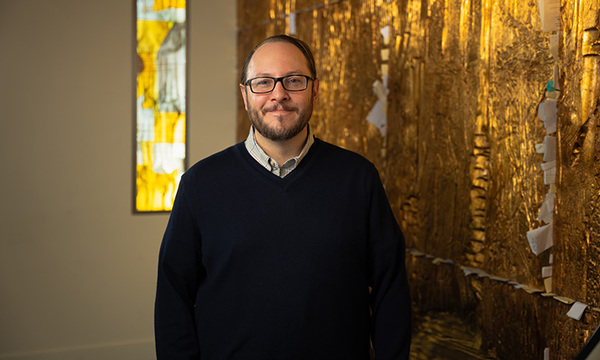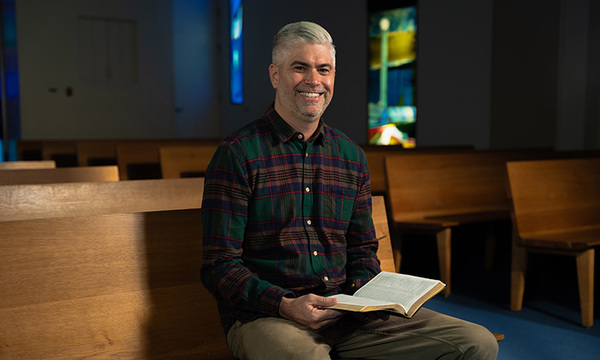Ideas matter. In fact, we are largely at the mercy of our ideas. Emotions and felt needs are important as well, but while they are wonderful servants, they are terrible masters!
The greatest issue of our day, especially for church leaders, is not learning how to meet people’s felt needs, reaching out in love to non-Christians, or having warm worship and solid small groups, as important as these are. No, the greatest obstacle to nurturing churches that last and grow disciples of Jesus involves the credibility and implications of a specific idea. This idea is so pervasive, it is in the very air we breathe even though most have not heard of the idea, or at least its name. And it has done terrible damage to churches, discipleship and Christian parenting. That idea is scientism.

In my new book, Scientism and Secularism: Learning to Respond to a Dangerous Ideology, I present this thesis: By understanding the nature and complete irrationality of the contemporary Western church’s primary enemy — scientism — one’s confidence in biblical Christianity will be strengthened, one’s witness will be emboldened, and unbelievers will have to take Christianity seriously. Because I doubt that learning about this would be on your top 10 list of the church’s greatest needs, let me take a step back and justify its selection.
It is on the basis of knowledge — not faith, mere true beliefs, or deeply felt convictions — that people have the authority to speak and act in public, along with the courage and boldness to do so. For example, dentists have the cultural authority to deliver relevant public lectures and act in certain ways — e.g., fill molars — and the courage to do both because we take them, quite rightly in this case, to possess the relevant body of knowledge. If my dentist told me that he actually did not know anything about molars, but he did have very deep feelings and faith commitments about them, he would not get within 100 miles of my mouth!
Thus, cultural authority to define a relevant range of reality, truth, and what it is rational to believe is deeded by people in that culture to those who have (or, at least, are taken to have) the relevant body of knowledge. The most important idea in a society is its understanding of who does and does not have knowledge, who gets to define reality, truth and rationality and who doesn’t. Thus, it is of the utmost importance for believers to grasp the culture’s ideas on this topic and engage in spiritual warfare wisely (See 2 Cor. 10:3–5).
Here is where scientism comes in. It is the idea that the only way — or the vastly, vastly superior way — to gain knowledge of reality and truth resides in and only in the hard sciences. As one advocate of scientism told me, if something like religious, ethical or related claims cannot be quantified and proven in the laboratory, then the claims are nothing but hot air, mere expressions of feeling that cannot carry any authority. Thus, the gospel may be safely disregarded and the demands of discipleship set aside when they are not convenient.
Scientism has led to cultural chaos in many ways, of which I shall mention three. First, a Barna Group poll discovered that there were six reasons why Millennials are leaving the church and Christianity. All of them involved doubts and various intellectual issues, of which one was key: The church was not adjusting to the claims of modern science and equipping believers to integrate those claims into a biblical worldview. Scientism implies that Christian claims are mere expressions of feeling with no authority to command belief.
Second, scientism has marginalized the church. Given our numbers, our impact on culture should be orders of magnitude greater than it is. Why is this? Because we lack boldness and courage, and society believes our religious ideas are irrelevant and not authoritative since they cannot be known. Ever witnessed to someone and he or she responds with “You can’t prove that scientifically”? The person may not know it, but he or she is assuming scientism. If you can prove the Bible is true scientifically, then I have to believe it. But if you can’t, I can reject it since there is no other way outside the hard sciences to know things.
Finally, scientism has led to Postmodern Relativism according to which all reality (e.g., gender) is a social construction, and reality, truth and values are relative to a group with the same feelings. If a science teacher said there was hydrochloric acid in a beaker, no one would accuse him or her of legislating chemistry, because we take such claims to be items of knowledge. But one is, in fact, accused of legislating religion or morality if one claims one’s views are true since according to scientism, such claims are unknowable expressions of emotion.
10 Key Insights in Scientism and Secularism
In light of this precarious situation, here are 10 important points I make in my book that are important to grasp. I present them in précis form, but they are developed in great detail in Scientism and Secularism.
1. Knowledge, not Faith or Mere Belief, Gives People Authority to Speak and Act in Public
It is on the basis of perceived knowledge that we give dentists, lawyers, history teachers and so on the authority to speak about matters within their areas of expertise. If a dentist said he had a set of deeply held beliefs about molars and was emotionally committed to those beliefs even though he didn’t actually know that his beliefs were true, he would not be allowed to continue as a dentist. Knowledge also gives people courage and boldness to speak because they know why they believe what they do.
2. Scientism is a Philosophical Thesis that Comes in Two Forms
Scientism is a position in philosophy, not science. The claims of scientism are assertions about science, not of science. Strong scientism is the view that the only knowledge we can have about reality are those that have been properly tested in the hard sciences (especially physics and chemistry). All other claims — e.g. theological, ethical, political, aesthetic — are mere expressions of emotion and private opinions. Weak scientism allows that there may be modestly justified beliefs outside science, but the settled assertions of the hard sciences are vastly superior to claims outside science.
3. Scientism Leads to Secularism and Marginalizes Christianity and Ethics
Scientism leads to the secularization of culture because it leads people to believe that no one can know anything about God, right and wrong, and so on. Thus, claims in religion and ethics can be ignored since no one can know whether those claims are reasonable or foolish.
4. Scientism is Causing People to Abandon Christianity
According to a Barna Group research poll, five of the six reasons people leave the church and abandon Christianity involve the suspicion that there is no good reason to believe it in the first place. As stated above, one of those six was the fact that the church does not keep up with and help parishioners keep up with the developments of modern science and know how to relate to them from a biblical worldview. Parents must understand that this is a big reason our children are abandoning Christianity when they leave home.
5. Strong Scientism is Self-Refuting
A statement/sentence is self-refuting if (1) it refers to a group of things; (2) the statement/sentence itself is included in that group; (3) the statement/sentence does not satisfy its own requirements of acceptability. For example, “All English sentences are shorter than three words” refers to the group of all English sentences, the sentence itself is a part of that group, and the sentence fails to satisfy its own requirements of acceptability (it contains eight words and, thus, is not shorter than three words). “The only knowledge we can have about reality are those that have been properly tested in the hard sciences” is not itself a statement about reality that has been properly tested in the hard sciences, so it cannot be a knowledge claim about reality. It is actually a claim of philosophy to the effect that all claims outside the hard sciences, including those of philosophy, cannot be known to be true.
6. Weak Scientism is a Foe and Not a Friend of Science
Science rests on a number of assumptions, e.g., the laws of logic and math, the correspondence theory of truth, the objectivity and rationality of the external world, our faculties are suited for gaining knowledge of the external world, including its deep structure that lies underneath the everyday world of commonsense and causes that world to be what it is. These assumptions cannot be formulated or tested within the limitations of science, especially the hard sciences. Yet every one of them has been challenged and rejected by many in the academic community. One of the tasks of philosophy is to formulate and defend the assumptions of science so science’s claims can be taken as approximately true and rational. A theory, including scientific theories, can only be as strong as the assumptions on which it rests. By disregarding the rationality of philosophy, weak scientism disallows the clarification and defense of science’s assumptions. Thus, weak scientism is a foe and not a friend of science.

7. Contrary to Scientism, There are Things we Know with Greater Certainty in Theology or Ethics than Certain Claims in Science
Consider these two claims: (1) Electrons exist. (2) It is wrong to torture babies for the fun of it. Which do we know with greater certainty? (2) is the correct answer. Why? The history of the electron has gone through various changes in what an electron is supposed to be. No one today believes that Thompsonian electrons (J. J. Thompson was the discoverer of electrons) exist because our views have changed so much. It is not unreasonable to believe that in 50 to 100 years, scientific depictions of the electron will change so much that scientists will no longer believe that what we mean by an electron today exists. Regarding (2), someone may not know how they know it is true, but nevertheless, we all, in fact, know it is true. If someone denies that, he needs therapy, not an argument. Now it is not hard to believe that in 50 to 100 years, most people will no longer believe (2). But it is hard to see what kind of rational considerations could be discovered that would render (2) an irrational belief. Thus, we have more certainty in (2) than in (1). And the same is true for certain theological assertions such as that God exists.
8. Five Things Science Cannot Explain but Theism Can
Here are at least five things science cannot explain but theism can: (1) The origin of the universe. (2) The origin of the fundamental laws of nature. (3) The fine tuning of the universe. (4) The origin of consciousness. (5) The existence of moral, rational and aesthetic objective laws and intrinsically valuable properties. Chapter 12 of the book explains why these are so.
9. Scientism Gains Strength from Methodological Naturalism
Methodological naturalism is the view that while doing science, explanations of phenomena must be limited to natural objects and natural laws. No appeal to the act of an agent or to personal explanation is allowed. This means, for example, that Intelligent Design theories and different versions of creationism are not science, but theology. Theistic evolution is the only view allowed. But methodological naturalism is false as seen by the number of sciences that explain things by reference to the intentional act of a personal agent and not to a natural object or law: forensic science, archeology, neuroscience, SETI (the search for extraterrestrial intelligence), psychology and others.
10. The Claims of Scientism and Their Refutation Must be Presented to Believers, Especially Parents and Pastors
We often fail in church to teach people why to believe what they believe. And we often do not prepare our children to engage ideas in the culture. Scientism is at the very foundation of our secular culture, and its nature and weaknesses should be a first priority in this area of church teaching. Second Corinthians 10:3–5 makes clear that ideas are at the very core of spiritual warfare. Believers must learn to recognize and undermine those ideas that make knowledge of God seem ridiculous to believers and unbelievers alike. And learning about scientism is of first importance in today’s spiritual battle.
This adapted article on Scientism and Secularism: Learning to Respond to a Dangerous Ideology (Crossway, September 2018) first appeared on Sept. 19, 2018, on crossway.org. Used with permission.
 Biola University
Biola University



